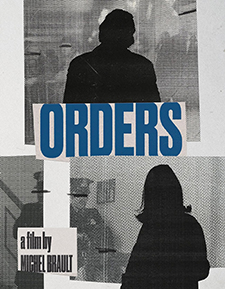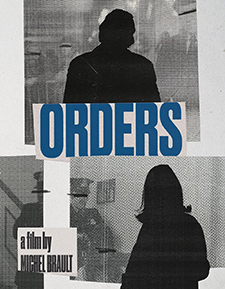Orders aka Les Ordres (Blu-ray Review)

Director
Michel BraultRelease Date(s)
1974 (January 28, 2025)Studio(s)
Les Productions Prisma/Les Cinémas Unis Ltée (Canadian International Pictures/Vinegar Syndrome)- Film/Program Grade: A
- Video Grade: A-
- Audio Grade: A
- Extras Grade: A
Review
Harrowing and infuriating accurately describe Michel Brault’s Orders (Les Ordres, 1974), a French-Canadian production little-seen and little-known outside of its native Canada. It’s one of the best Blu-ray releases of the year.
Filmed in a semi-documentary, cinéma vérité style in both black-and-white and color, it dramatizes at a deeply personal level the impact of the War Measures Act enacted by the Canadian government of Pierre Trudeau following the 1970 October Crisis. Provincial Labour Minister Pierre Laporte and British diplomat James Cross were kidnapped by members of the Front de liberation du Québec (FLQ). Trudeau’s response was an invocation that suspended civil liberties, allowing police and other enforcement agencies to enter and search the homes of innocent civilians without warrant, to arrest and jail them without charge for weeks, and with impunity inflict psychological trauma that, in some cases, were effectively torture. During this incarceration, victims were dehumanized, held in secret locations, and unable to communicate with their families or attorneys. Nearly 500 innocent Canadians who had done absolutely nothing wrong were put through this inexcusable treatment.
Orders follows the experiences of five such victims, three men and two women. The characters appear to be composites of real victims, Brault’s screenplay based on testimonies of (and perhaps directly quoting from) those involved. The five are: textile union activist and taxi driver Clermont Boudreau (Jean Lapointe) and his spouse, Marie (Hélène Loiselle), a housewife and mother of three children; Dr. Jean-Marie Beauchemin (Guy Provost), head of a low-income health clinic; social worker Claudette Dussealt (Louise Forestier); and Richard Lavoie (Claude Gauthier), a stay-at-home father of two small children.
The film is reminiscent of—though far more disturbing than—the early scenes in Hitchcock’s The Wrong Man (1957), where a wrongly-accused New York City musician (Henry Fonda) is mistaken for a hold-up man. He duly complies with the police who question him but don’t tell him anything about what he’s being accused of. In Orders, police burst into homes without a warrant (“We don’t need one”), arrest and process detainees, completely disinterested that these parents, in some cases, are being arrested in front of and torn from their terrified children. They are never informed what they are being accused of, let alone charged, but they are processed like common criminals, subjected to humiliating strip searches and modern dehumanizing incarceration techniques, including shaving off beards of some of the men and generally treated like caged animals.
A sustained, quiet panic overwhelms each of the five victims. They have no idea when, if ever, they will be released. Maybe five days, perhaps five years. They agonize over their families, who cannot contact them and are denied information regarding their whereabouts. While incarcerated, Clermont Boudreau’s father dies after a long illness; only begrudgingly do his keepers take him to the funeral home to see his body.
The film is powerful from beginning to end, sometimes in unexpected ways. The prisoners are deliberately fed only vile, basically inedible porridge the first several days, then “rewarded” with a can of soda and a bag of potato chips. Clermont Boudreau is fully aware of this methodical, inhuman manipulation, but can’t help wolf down the “treat,” weeping as he does.
They are also deliberately lied to as part of this policy of psychological assault, told they’re being released only to be transferred to another cellblock or prison. In the case of Richard Lavoie, sadistic prison guards inform him that he’s to be executed in three days. After spending that time in a constant, catatonic state of absolute terror, he’s taken to a basement firing range and told to stand against a wall. (Spoilers) That the guards fire blanks does not diminish the cruelty; following his release Lavoie ended up in a psych ward.
Almost worse, most of the guards and policemen are, as the title suggests, blandly and without emotion just following “orders.” Housewife Marie notes one arresting officer quietly anguished by the obvious violations of basic human rights swirling about him—yet does his job anyway, without protest. That everything is so accepted as “normal” is its greatest horror.
Much of the film’s power comes from its intimacy and geographical immediacy. One expects such flagrant injustices from fanatical Middle East countries, but Canada? The nation that gave us John Candy, Elwy Yost, and Mr. Dressup?
Adding to its power is how throughout Orders, the appalling real-life historical events of 55 years ago in Canada seem almost inevitable, and on a much larger scale, in the United States of America in 2025. One might argue it’s already happening, even now, if on a smaller, much less publicly acknowledged manner.
Perhaps taking a page from the playbook of Powell & Pressburger, Brault unexpectedly photographs the jail scenes in color, while the “outside world” is in stark black-and-white. Brault gets excellent performances from his cast, though I didn’t care for the awkward device of having each actor introduce themselves (as themselves), announcing at the beginning the name of the person each would be playing.
Overall, though, Orders is superb. I had never heard of it before, and suspect outside Canada few others have, yet it deserves a much wider audience.
Canadian International Pictures (CIP) has been churning out one great release after another, always chock-full of extra features, this being no exception. The transfer, in 1.66:1 widescreen, is derived from the original 35mm camera negative, with some portions utilizing internegative and interpositive elements, but the image is always impressive, with a strong documentary-like flavor. The DTS-HD Master Audio (2.0 mono) is likewise strong, the French-Canadian dialogue supported by English subtitles, and the disc is Region-Free.
The seemingly endless supplements consist of the following: a new audio commentary featuring filmmaker/professor Frédérick Pelletier and author/professor Gabrielle Tremblay; Images of Immediacy (25 minutes), a new interview with author/professor André Loiselle; Love at First Sight (17 min.), a new interview with sound recordist Serge Beauchemin; A Peaceful Nation: The Road to October 1970 (18 min.), a new interview with film historian/professor Sylvain Garel; Filming the FLQ (17 min.), featuring Garel on felquism in cinema; In the Shadow of Kafka (18 min.), a new interview with author/professor Angelos Koutsourakis; The October Crisis: 50 Years On-Screen (2020, 13 min.), featuring interviews with filmmaker Mathieu Denis, actress Louise Forestier, actor Claude Gauthier, and filmmaker Félix Rose; Michel Brault Lives Again at Cannes (2015, 13 min.), with interviews with Brault, Gautier, and Jean Lapointe; On Screen (2008, 48 min.), a documentary on the making of the film; Les raquetteurs (1958, 15 min.), the groundbreaking documentary short co-directed by Brault; plus trailers for four films including Orders. Also included is a full-color booklet featuring essays and photographs.
A remarkable film, Orders is not to be missed and one of 2025’s best Blu-ray releases.
- Stuart Galbraith IV

